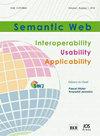A survey on knowledge-aware news recommender systems
IF 2.9
3区 计算机科学
Q2 COMPUTER SCIENCE, ARTIFICIAL INTELLIGENCE
引用次数: 11
Abstract
News consumption has shifted over time from traditional media to online platforms, which use recommendation algorithms to help users navigate through the large incoming streams of daily news by suggesting relevant articles based on their preferences and reading behavior. In comparison to domains such as movies or e-commerce, where recommender systems have proved highly successful, the characteristics of the news domain (e.g., high frequency of articles appearing and becoming outdated, greater dynamics of user interest, less explicit relations between articles, and lack of explicit user feedback) pose additional challenges for the recommendation models. While some of these can be overcome by conventional recommendation techniques, injecting external knowledge into news recommender systems has been proposed in order to enhance recommendations by capturing information and patterns not contained in the text and metadata of articles, and hence, tackle shortcomings of traditional models. This survey provides a comprehensive review of knowledge-aware news recommender systems. We propose a taxonomy that divides the models into three categories: neural methods, non-neural entity-centric methods, and non-neural path-based methods. Moreover, the underlying recommendation algorithms, as well as their evaluations are analyzed. Lastly, open issues in the domain of knowledge-aware news recommendations are identified and potential research directions are proposed.基于知识感知的新闻推荐系统研究
随着时间的推移,新闻消费已经从传统媒体转向在线平台,后者利用推荐算法,根据用户的偏好和阅读行为,推荐相关文章,帮助用户在大量的每日新闻流中导航。与推荐系统已经证明非常成功的电影或电子商务等领域相比,新闻领域的特征(例如,文章出现和过时的频率高,用户兴趣的更大动态,文章之间不太明确的关系以及缺乏明确的用户反馈)对推荐模型提出了额外的挑战。虽然传统的推荐技术可以克服其中的一些问题,但已经提出将外部知识注入新闻推荐系统,以便通过捕获文章文本和元数据中不包含的信息和模式来增强推荐,从而解决传统模型的缺点。本调查提供了知识感知新闻推荐系统的全面回顾。我们提出了一种分类法,将模型分为三类:神经方法、非神经实体中心方法和非神经路径方法。此外,还分析了潜在的推荐算法及其评价。最后,指出了知识感知新闻推荐领域存在的问题,并提出了潜在的研究方向。
本文章由计算机程序翻译,如有差异,请以英文原文为准。
求助全文
约1分钟内获得全文
求助全文
来源期刊

Semantic Web
COMPUTER SCIENCE, ARTIFICIAL INTELLIGENCEC-COMPUTER SCIENCE, INFORMATION SYSTEMS
CiteScore
8.30
自引率
6.70%
发文量
68
期刊介绍:
The journal Semantic Web – Interoperability, Usability, Applicability brings together researchers from various fields which share the vision and need for more effective and meaningful ways to share information across agents and services on the future internet and elsewhere. As such, Semantic Web technologies shall support the seamless integration of data, on-the-fly composition and interoperation of Web services, as well as more intuitive search engines. The semantics – or meaning – of information, however, cannot be defined without a context, which makes personalization, trust, and provenance core topics for Semantic Web research. New retrieval paradigms, user interfaces, and visualization techniques have to unleash the power of the Semantic Web and at the same time hide its complexity from the user. Based on this vision, the journal welcomes contributions ranging from theoretical and foundational research over methods and tools to descriptions of concrete ontologies and applications in all areas. We especially welcome papers which add a social, spatial, and temporal dimension to Semantic Web research, as well as application-oriented papers making use of formal semantics.
 求助内容:
求助内容: 应助结果提醒方式:
应助结果提醒方式:


